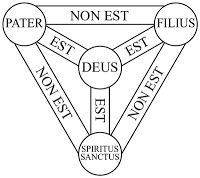I believe in the Bible. I find it is a beautiful book and when rightly divided it is a reliable rule for what I believe and how I behave. However there is a great deal of things I believe in which are not explicitly mentioned in the scriptures. Chief among these is the doctrine of the Trinity. Although the word trinity is never mentioned explicitly in the Bible the theological underpinnings that it imparts are core to any orthodox understanding of God. The Catholic Catechism is truly accurate when it states “[The Trinity] is the most fundamental and essential teaching in the ‘hierarchy of the truths of faith.'”
 This is a bold claim, and one that many Protestants have difficulty in accepting. For many christian today the Trinity seems like a highfalutin concept with little to no practical application in their lives. Some might even argue that a true “Bible Believer” wouldn’t teach a doctrine like the Trinity. Today I hope to defend the reasons I believer in a triune God: Father, Son, and Holy Spirit; one God in triunity.
This is a bold claim, and one that many Protestants have difficulty in accepting. For many christian today the Trinity seems like a highfalutin concept with little to no practical application in their lives. Some might even argue that a true “Bible Believer” wouldn’t teach a doctrine like the Trinity. Today I hope to defend the reasons I believer in a triune God: Father, Son, and Holy Spirit; one God in triunity.Eight Reasons I believe in the Trinity:
Reason 1: I believe the story of Jesus told to us in the Gospels and the rest of the New Testament is true.
I have to start here because I know that many people do not. Believing in the Gospels does not mean you will necessarily come to the conclusion that God is to be worshiped in Trinity, and Trinity in unity. Many groups throughout history have indeed read through the Gospels and come to a very different conclusion about it all. However, if you don’t believe this story of Jesus to be true the rest of my arguments will hold absolutely no water with you. At the heart of a Trinitarian formulation is a Christological declaration.
Reason 2: The Bible breathes the language of the triadic formula.
If you have a bible with a concordance pull it out and look up the word “trinity.” You may be surprised to find there is nowhere in the Bible that uses the word trinity. However if your Bible has an index you may find a different story. The Bible near me has 50 cross references under the category trinity. What is the reason for this disparity you might ask? The answer is simple. The word Trinity was developed as shorthand way to pack up all the testimony in scriptures that was already there. If you want to see the trinity in the Bible it doesn’t take a whole lot of work. Let me give you a few examples. (NIV)
- Because you are sons, God sent the Spirit of his Son into our hearts, the Spirit who calls out, “Abba, Father.” (Galatians 4:6)
- May the grace of the Lord Jesus Christ, and the love of God, and the fellowship of the Holy Spirit be with you all. (2 Corinthians 13:14)
- For through him we both have access to the Father by one Spirit. (Ephesians 2:18)
I could go on and on, but I hope my point is clear. The language of Father, Son, and Holy Spirit is not something that suddenly appeared 300 years after Jesus’ earthy ministry; it’s been here all along.
Reason 3: The Bible expresses the action of God in Triunity.
The Bible doesn’t just talk about God as Father, Son, and Holy Spirit; it also demonstrates it. From the first verses of the Bible, where we see God Creating, hovering as Spirit, and pouring forth as Word, to the baptism of Jesus where the spirit descends and the Father’s proclamation of Jesus’ son-ship is announced; God is shown acting in triunity. And how about the story of the Annunciation? In Luke 1:35 the Son becomes incarnate in Mary when the Spirit comes upon her and the power of the Almighty overshadows her. The triunity of God’s action here seems pretty clear. Another demonstration of the Trinity can be seen in Acts 8. Here believers in Samaria, after receiving the word of God must then to receive the Holy Spirit through the laying on of hands, having been only baptized in the name of Jesus. Once again there are plenty of other examples of this kind of demonstration, just because the word “Trinity” is not used does not mean that the triunity of God is not demonstrated.
Reason 4: The Trinity affirms what God has communicated that God is not
There is an area of theology called apophatic theology. This is the theology that tells us about God by negating things that God has revealed himself not to be. For example, God is NOT evil or God is NOT mortal. The language of Trinity came out of conflict. There were people saying things about God that were clearly false to many early Christians. The Trinity affirms the testimony about God in these key areas:
- God is indivisible, contrary to what some Monophysites taught (look at Exodus 20:1-3)
- Jesus is not a created being, contrary to a belief held by the Arians (John 1:1)
- The Holy Spirit is not created, contrary to a belief held by Pneumatomachians (See how the spirit is given the transcendent qualities of God in Psalm 139:7-8 and 1 Corinthians 2:10-11)
Reason 5: The Trinity affirms what God has communicated that God is
Above we talked about theology by negation. Now I would like to talk about theology using positive terminology. This is called cataphatic theology. Many consider this theology to be even more tenuous then the previous because it puts limits on God by defining God. Trinitarian theology enters this realm too, this is perhaps why Augustine once said, “There is no subject where error is more dangerous, research more laborious, and discovery more fruitful than the oneness of the Trinity of the Father, the Son, and the Holy Spirit” (De Trinitate, 1.3.5.).
So what does Trinitarian theology affirm about God? In a nutshell, God is Love (1 John 4:7).
The Trinitarian revelation of God as love is powerful. If God is not triune it is very difficult to see God as love. A biblical understanding of love, like the one we see in 1 Corinthians chapter 13, shows us that at the heart of love is selfless giving. In other words to love one must have a relationship with a beloved. A love that is pointed towards ones self is no real love, but narcissism. If we indeed dare to call God “Love” there must be, in God’s nature, relationship. If God is not community then we are left with two terrible options. Either God is NOT true love, but a narcissist OR God is true love but requires us to fulfill his nature. In both cases you and I, and all of creation are in some way put in the impossible place of fulfilling God’s needs. Our life in God is therefore not incarnational but supplementational. Woe to all whom are created by this sort of architect.
Reason 6: The term ‘Trinity’, although not found in the Bible, comes from the same hands that gave us the Bible.
Like it or not, the Bible didn’t drop from the heavens into your hands, neither was it dictated to us by Christ himself. Getting the Bible to us today was a messy process that was settled by councils of bishops throughout the world. Eventually a catholic (universal) consensus on the books of the New Testament emerged. The funny thing about this whole process is that the people who made the decision on what was in and what was out did so partially on the basis of if what was written was doctrinally sound, and the trinity was one of the primary doctrines they affirmed. Rejecting the Trinity is in one sense rejecting what makes the Bible authoritative in the first place.
Reason 7: The Trinity is affirmed in the Creed
The Trinity is affirmed by the Creed. By “The Creed” I mean specifically the Nicene Constantinopolitan Creed (although all the great Christian creeds affirm the Trinity). I know this may be a sore spot for you. There are many today who hold to this motto of “No Creed but Christ.” People are often apprehensive to any profession of faith that people have. “No Creed but Christ” comes from some very good intentions, however “no creed but Christ” is one of the shortest and worst creeds one can have. Inherent to all belief is a set of assumptions that filter everything that we say and do. Biblical scholars describe these as “hermeneutical lenses,” and we all have them. The question that we all must then ask is, “where am I getting my lenses from.”
Our lenses are the foundation and support from which we build our entire understanding of truth on. The question any good Bible believing Christian should now ask themselves is, “does the Bible tell us where we can find foundation for truth or pillars to hold it up?” Thankfully the answer is, “yes!” Lets take a look 1 Timothy 3: 15. Here we find out what the “the pillar and foundation of the truth” is. It’s the Church!
I believe in the Creed because I want to build on the right foundation; the Creed, in turn, teaches Trinity. I trust the lenses that have been handed down to me through the Apostles and the great Saints of the Church much more then any lenses I could hope to craft myself. “No creed but Christ” actually tells me nothing, so I build my foundation on nothing but myself. The doctrine of the Trinity is grounded on a firm foundation.
Reason 8: The Resurrection of Jesus
At last we have come to Reason Eight. If the Trinity is indeed at the center of an orthodox understanding of God, we may expect to find it as a central part of God’s most revelatory act of God’s own self. This action is the Resurrection. In the Resurrection we find the vindication of love. In the death of Jesus Christ we see what loving action looks like. Jesus pours out himself in love by humbling himself taking on flesh and became obedient even to the point of death on a cross. The Father responds in Love by Raising him to Life (Acts 2:24) by the Power of the Holy Spirit (Romans 8:11). This vindicates Christ and brings the Divine life of love into our communicable world. Because the love of God is made manifest in the flesh of a man we too can participate in the life of Resurrection as God raises us up through that same spirit (Romans 8:11). I believe in the Trinity because in the Trinity is my salvation. Thanks be to God!













